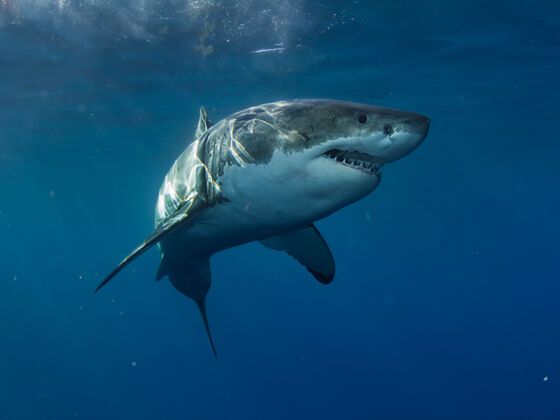Divers there to check out the marine wildlife reported as many as 10 Costa Rican trawlers illegally working the area, and beneath the water saw dead sharks of several species, including hammerhead, Galápagos, and whale sharks, their finless corpses on the ocean floor.

Mass Shark Slaughters in Pacific Waters Call for Action
The practice of finning sharks is a brutal one. Fishermen cut the fins off without regard to whether or not the sharks are still alive, and their bodies are dumped back into the ocean — if they are still alive, they most certainly won’t survive long. Each fin can fetch a price as high as $200 in China, where shark fin soup has seen a boom to match the improving financial situation there. Served at weddings, the soup goes for more than $60 a bowl. What that means for sharks is that they are more threatened than ever.
During a recent trip to Ecuador, I met videographer Tim Watters, who works for Sea Shepherd. In the Galápagos, documenting a recent project to install AIS transponders on many of the islands there to monitor fishing vessels, Sea Shepherd bore witness to the Ecuadorian navy’s capture of Reina del Cisne — a boat within the waters of the Galapagos Marine Reserve with 82 dead sharks in its hull just last month. In July, the boat Fer Mary was caught in the reserve with 357 sharks. Tim told me that people in helicopters flying over Isla Isabella have reported huge fin drying operations after mass slaughters of sharks.
The legal system in the Galapagos is not prepared to handle cases such as these, and the sad fact is that the fishermen and the boats are set loose more often than not, with no one answering for the crimes. The Guardian says that the most recent mass slaughter of sharks in Mapelo involved Costa Rican trawlers. While the Costa Rican government condemns the action, the incident occurred under jurisdiction of the Colombian Navy. There were no navy vessels in the area at the time of the reported incident. When the Navy responded to the report last Sunday, they arrived in time to catch only an Ecuadorian vessel with 300kg of illegally captured wildlife.
Shark poaching is a serious issue. Sharks enforce the natural balance of the marine ecosystem. They’re at the top of the food chain, so as shark populations grow scarce, other species multiply at alarming rates, causing an overabundance of smaller fish and jelly fish, which leads to dead areas in oceans and the upset of the natural balance of sea life. Sharks do not reproduce at the rate of other fish — it is simply not possible for shark populations to bounce back from this sort of mass culling.
Sea Shepherd is working toward a solution for shark finning in the Galapagos, among their other projects. The first step is in place now that the AIS systems are installed. Now, the problem becomes compliance, and enforcement. In remote waters, such as the Northern Islands of the Galapagos, and the Mapelo Marine Sanctuary, eyes on what’s happening is a first step, but governmental cooperation and law enforcement are key.
Shark finning is a billion-dollar industry. The rewards are too high to simply stop the practice through education. Mass slaughter of sharks has to end to maintain balance in our oceans. Read more about shark finning and find out what you can do to help stop it at SeaShepherd.org.